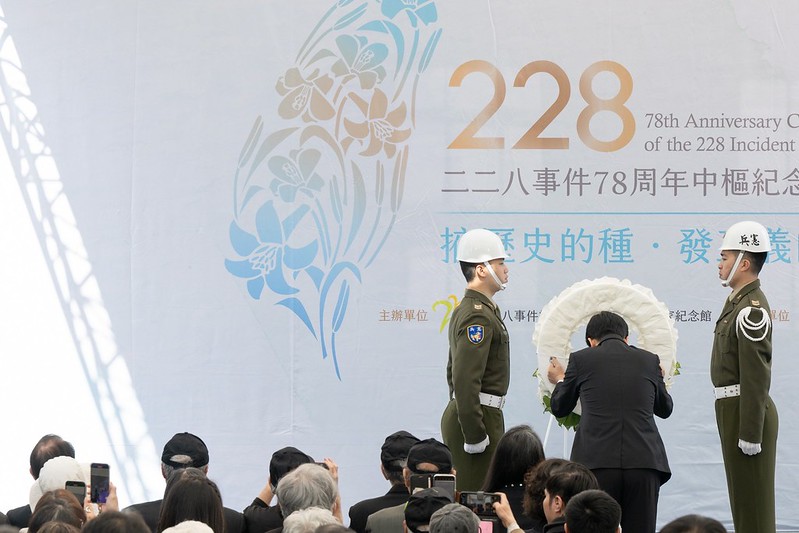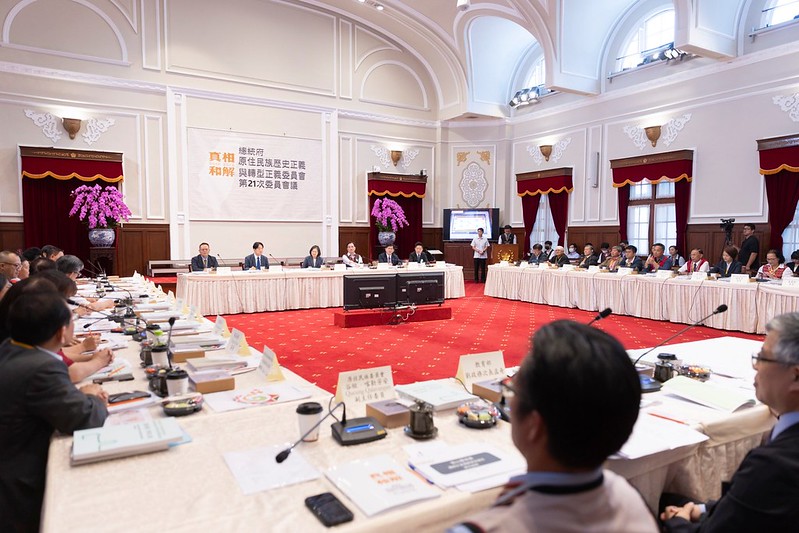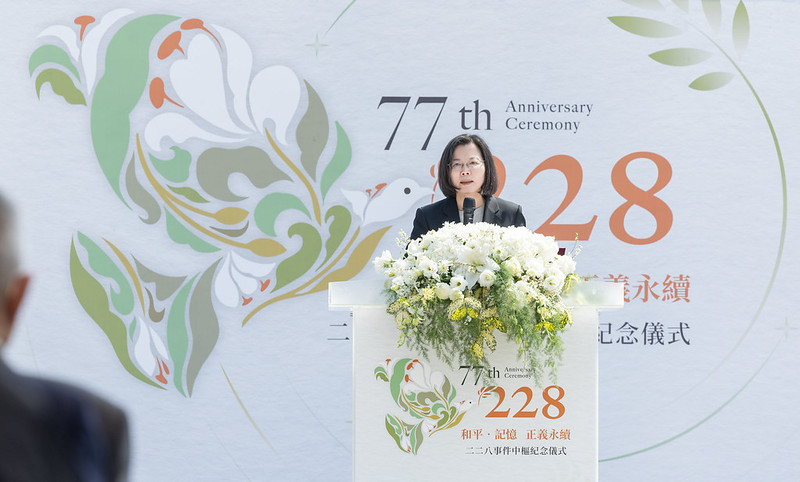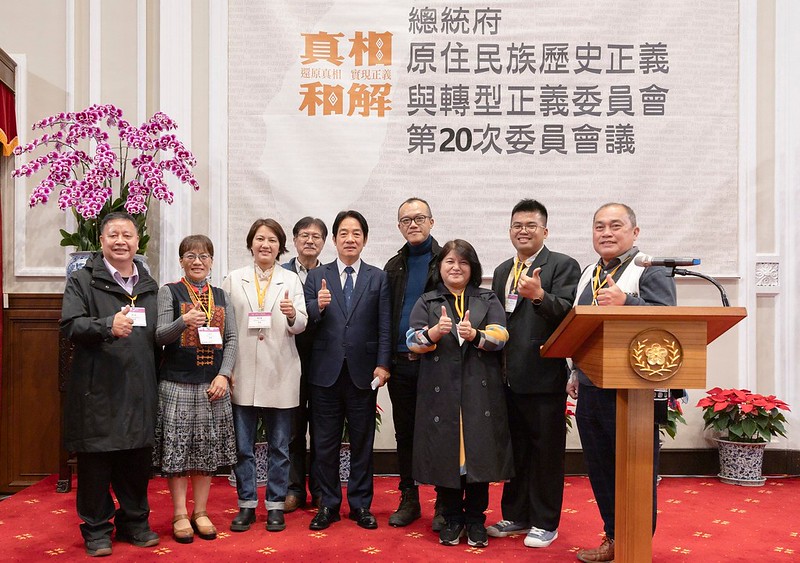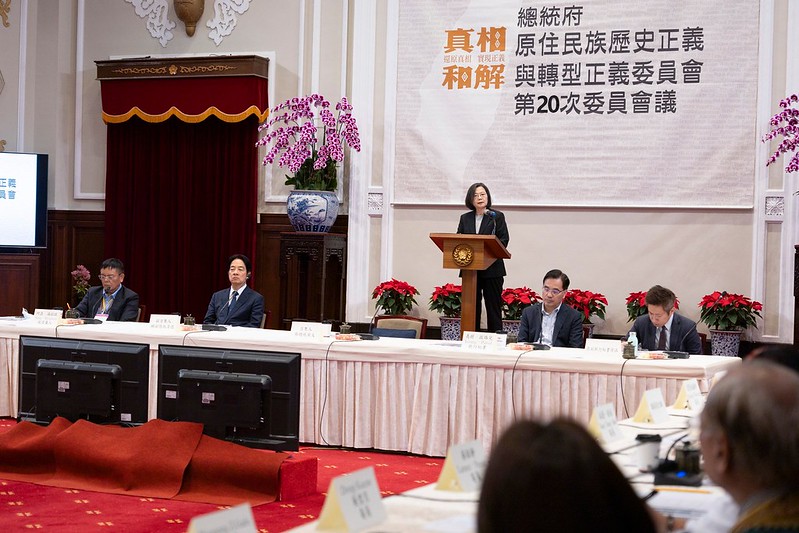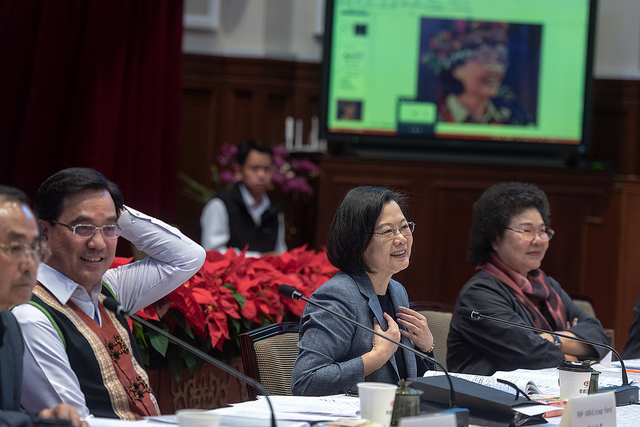News & activities
 News releases
News releases
Committee Convener President Tsai Ing-wen presided over the eighth meeting of the Presidential Office Indigenous Historical Justice and Transitional Justice Committee (the Committee) on December 21, which ran for about two and a half hours.
The meeting agenda included two reports. The first was an annual progress report on the formal trilateral negotiations regarding mining at the Asia Cement Corporation's (ACC) Xincheng Mountain Mine. The second was a midterm progress report from the Subcommittee on History, followed by a discussion of proposals made by Committee members about indigenous education issues.
Progress reports on the ACC case negotiations were delivered by Director-General Jing-Wen Hsu (徐景文) of the Bureau of Mines of the Ministry of Economic Affairs and Director Du Chang Mei-chuang (杜張梅莊) of the Land Administration Department of the Council of Indigenous Peoples (CIP). After listening to these reports and comments by Truku tribe representative Teyra Yudaw (帖喇‧尤道), the president issued the following three directives:
First, she thanked Committee member Teyra Yudaw, other Committee members who have participated in the negotiations, Minister without Portfolio Lin Wan-i (林萬億), Minister of Economic Affairs Shen Jong-Chin (沈榮津), CIP Minister Icyang Parod (夷將‧拔路兒), and Bureau of Mines and CIP personnel. ACC case negotiations have made important progress over the past year, she said, thanks to the collective efforts of so many people.
Second, all parties concerned have taken the key initial step by moving from confrontation to negotiation. The president hopes that next year everyone will continue to work together so that issues like residential safety and land dispute fact-finding investigations will make steady progress and address the demands of local indigenous people.
Third, and more importantly, all three parties—the Truku people, the ACC, and the government—have agreed to initiate discussions on transforming mining areas. The question, the president said, is how to launch an orderly transformation plan while doing our best to consider the rights of indigenous people, environmental and ecological concerns, and industry needs. President Tsai requested that the relevant government ministries and agencies continue to provide assistance, and expressed hope that this case will resolve conflicts, promote reconciliation, and become a model for transitional justice in Taiwan.
Subcommittee Convener Wusai Lafin (林素珍), reporting for the Subcommittee on History, then briefed the Committee on the treatment of indigenous peoples in basic education curriculum standards, guidelines, and textbooks after World War II. Following a lively exchange of views among the Committee members, the president issued the following three-point response:
First, she praised the Subcommittee on History's efforts over the last year-and-a-half. In addition to analyzing the content of past textbooks and curriculum guidelines, they have also gathered ideas from indigenous peoples and submitted them for consideration by the research and revision panels for new curriculum guidelines.
Second, she was happy to see that the independent Curriculum Council for Elementary and Secondary Schools and the research and revision panels, using their professional expertise, have already produced new 12-year Basic Education curriculum guidelines that incorporate more about indigenous peoples' diverse historical and cultural perspectives. These concrete changes show that Taiwan society continues to gain a greater understanding of indigenous historical justice and transitional justice.
Third, she asked the Ministry of Education to persevere in carefully promoting complementary tasks after the new curriculum guidelines are introduced, including the research and development of teaching materials and teacher training, to promote greater understanding of the educational concepts underlying the new curriculum guidelines.
Committee members submitted eighteen proposals at the meeting, including five related to indigenous education. They included a suggestion by Sakizaya tribe representative Yiyang Sayion (伊央‧撒耘) to "proactively invest in AI natural dialogue language systems to save endangered languages"; a suggestion by Savi Takisvilainan (蘇美琅), an academic expert on the Committee, to "set up an indigenous education administration in the Ministry of Education to handle indigenous education matters nationwide"; a suggestion by southern Pingpu tribe representative Uma Talavan (萬淑娟) that "under the policy of developing Taiwan into a bilingual nation, give equal importance to planning related to official languages and mother-tongue education "; and two suggestions by Rukai representative Saidai Tarovecahe (伍麗華), one to "organize a task-based research center to construct knowledge systems, produce curriculums, and train specialized teachers according to each indigenous group," and another to "set up special classes or programs for indigenous peoples in management and governance of land, forests, and wild flora and fauna, to cultivate indigenous talent."
Minister of Education Yeh Jiunn-rong (葉俊榮) and CIP Minister Icyang Parod responded separately to these proposals, and after lively discussions among Committee members, the president issued the following three-point response:
First, education for indigenous peoples is an important undertaking. Past government education policies have caused indigenous peoples to lose their own languages and cultures. This lines up with the historical truths gradually uncovered by the subcommittees on culture, languages, and history. So now, we should use indigenous education to allow indigenous children to "learn within their cultures." This is the way to achieve justice, she said.
Second, the Executive Yuan is now making comprehensive revisions to the Education Act for Indigenous Peoples, and legislators have proposed their own versions. Those revisions cover all the issues that Committee members are concerned about—including knowledge systems, teacher qualifications, curriculums, teaching materials, and the competent authority. Committee members' views will also be taken into account during the revision process.
Third, in addition to legislation, many administrative measures can be adopted immediately, and some have already been initiated. The president asked the Ministry of Education and the CIP to refer to these measures in handling this issue, hoping that in implementing related policies, the government will always give careful consideration to the needs of each indigenous group. The key to handling indigenous education properly is to respect the agency of indigenous peoples.
Finally, the president thanked the Committee members for conveying their peoples' voices, and proposing numerous suggestions about indigenous education. She also noted that next year the annual meeting of the World Indigenous Nations Higher Education Consortium will be held in Taiwan, and the CIP will do its best to support funding for that event.
